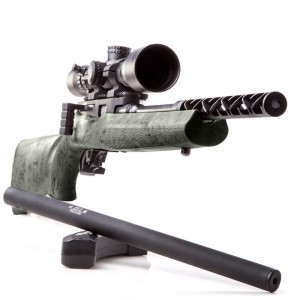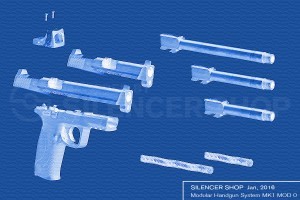What would silencers look like without the NFA?
 Over the last couple of months I've started to wonder what standard firearms would look like if they were regulated by the National Firearms Act (NFA).
For example, look at the existing pistols from Glock, Smith & Wesson, or Springfield Armory and you'll see dedicated models for just about every purpose:
Do you want a small/single-stack version for concealed carry? No problem.
Are you looking for a long slide version for competition use? They've got you covered.
Need a convenient holster-able side arm, a home defense pistol, or something with a threaded barrel for your suppressor? Check, check, and check.
I even own different color combinations of my favorite pistols that I've collected over the years.
The same is true of rifles of just about every type - just look at the Remington 700 and you'll see more than 100 different combinations of styles and calibers.
Over the last couple of months I've started to wonder what standard firearms would look like if they were regulated by the National Firearms Act (NFA).
For example, look at the existing pistols from Glock, Smith & Wesson, or Springfield Armory and you'll see dedicated models for just about every purpose:
Do you want a small/single-stack version for concealed carry? No problem.
Are you looking for a long slide version for competition use? They've got you covered.
Need a convenient holster-able side arm, a home defense pistol, or something with a threaded barrel for your suppressor? Check, check, and check.
I even own different color combinations of my favorite pistols that I've collected over the years.
The same is true of rifles of just about every type - just look at the Remington 700 and you'll see more than 100 different combinations of styles and calibers.
Now, Let's Look at the Silencer Market
Because suppressors are regulated under the NFA, customers tend to want a one-model-does-it-all solution - especially on their first purchase. As a result, suppressor companies often focus on models that are a 'Jack of all trades, master of none'. Personally I think this do-it-all trend can be a good thing - up to a point. In reality, it's the free market reacting to government intervention. The problem is when a first-time buyer gets their .50 caliber suppressor home and shoots it on an AR15. The results are invariably disappointing because the bore size is just too big to be effective - and they don't realize the full benefit of shooting suppressed. Because suppressors are so awesome, I suspect the market would be significantly different if it weren't for the NFA. Here is a short list of things I think would change:- Most firearms would include an integral suppressor that was tuned specifically to that weapon's purpose
- Suppressor modularity wouldn't be as important, and the focus would shift to making the best suppressor for a single purpose
- Prices would be significantly lower - I suspect they'd be more in line with the price of a flashlight (ranging from just a few dollars to several hundred)
Imagine the Firearm Market if it were under the NFA
 Just take a few seconds to imagine what the firearm market would look like if it were regulated the same way as the silencer market. Imagine how you, as a customer, would react if you had to wait 6+ months to get a new pistol.
In that imaginary world, I suspect there wouldn't be dozens of models of M&P pistols dedicated to different purposes. Instead, you'd see a surge in popularity of interchangeable barrels & slides - and you wouldn't be able to buy additional parts without sending them back to the manufacturer for replacement.
Firearms, in general, wouldn't be tuned to specific purposes; and we'd see more models that did an OK job of everything instead of an excellent job at just one task.
We'd be interested to know how you think firearms would look if they required a $200 tax stamp and a multi-month waiting period. Please chime in with your comments below.
Just take a few seconds to imagine what the firearm market would look like if it were regulated the same way as the silencer market. Imagine how you, as a customer, would react if you had to wait 6+ months to get a new pistol.
In that imaginary world, I suspect there wouldn't be dozens of models of M&P pistols dedicated to different purposes. Instead, you'd see a surge in popularity of interchangeable barrels & slides - and you wouldn't be able to buy additional parts without sending them back to the manufacturer for replacement.
Firearms, in general, wouldn't be tuned to specific purposes; and we'd see more models that did an OK job of everything instead of an excellent job at just one task.
We'd be interested to know how you think firearms would look if they required a $200 tax stamp and a multi-month waiting period. Please chime in with your comments below.
Conclusion
As the silencer market grows, it will continue to attract more and more attention from federal regulators - which we've already started to see with the newly enacted ATF 41F rule change. This is why supporting the American Suppressor Association is so important. Just remember to balance versatility vs efficiency when you start looking to purchase a suppressor - it's easy to go too far down the one-silencer-does-it-all path, and you'll often find the results to be pretty disappointing.0 Comment(s)





